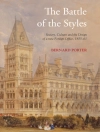Vernon Lee’s ‘Euphorion’ is a seminal work that delves into the intricate web of influences between the antique, medieval, and Renaissance periods. Through a series of meticulous studies, Lee navigates the reader through the artistic and intellectual evolution that took place during this pivotal era in European history. With a keen eye for detail and a lyrical prose style, Lee examines the nuanced relationships between classical ideals, medieval traditions, and the rebirth of humanism in the Renaissance. The book’s rich historical context and insightful analysis make it a must-read for anyone interested in the complexities of cultural appropriation and evolution in art and literature. Lee’s meticulous research and engaging writing style make ‘Euphorion’ a valuable resource for scholars and enthusiasts alike, shedding light on the interconnectedness of artistic movements across centuries. Vernon Lee, a pseudonym for Violet Paget, was a British writer and art historian known for her expertise in aesthetics and cultural history. Her deep knowledge of art, literature, and philosophy is evident in ‘Euphorion, ‘ where she seamlessly weaves together diverse strands of thought and creativity. Lee’s unique perspective and multidisciplinary approach to the subject matter make her a standout figure in the field of cultural studies. I highly recommend ‘Euphorion’ to readers seeking a comprehensive exploration of the interplay between the ancient, medieval, and Renaissance periods. Lee’s insightful analysis and eloquent prose offer a thought-provoking journey through the complexities of cultural evolution, making this book a valuable addition to any scholarly library.
Giới thiệu về tác giả
Vernon Lee (real name Violet Paget, 1856-1935) was a British writer who is remembered today primarily for her supernatural fiction and her work on aesthetics. An early follower of Walter Pater, she wrote over a dozen volumes of essays on art, music, and travel. Along with Pater and John Addington Symonds, she was considered an authority on the Italian Renaissance, and wrote two works that dealt with it explicitly, Euphorion (1884) and Renaissance Fancies and Studies (1895).












